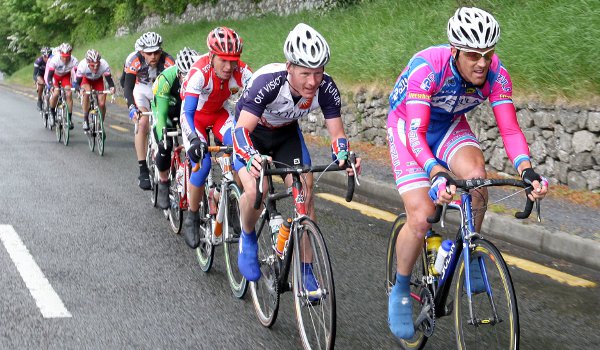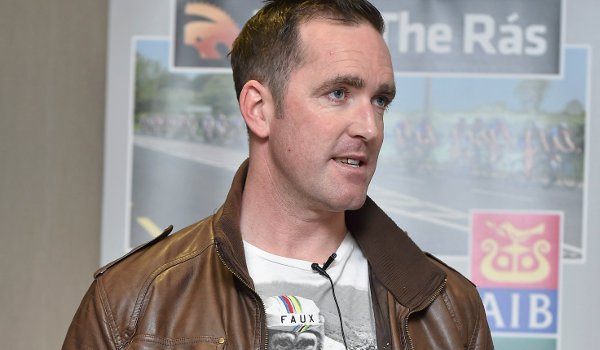AS a sporting nation, big events regularly pass us by.
There has never been — nor ever will be — a football World Cup staged in Ireland and while the rugby equivalent may eventually end up here, for now we have to survive on a diet of rations — a Europa League final or Heineken Cup decider — to keep us entertained, in between the odd landmark occasion like the 1998 Tour de France or 2006 Ryder Cup.
Bearing this in mind, then, the fact that the Giro d’Italia — cycling’s second biggest prize — is starting in Ireland this Friday is something, you would imagine, that would capture the public’s imagination.
Instead, it has slipped underneath the radar — a point Sean Kelly wasn’t shy complaining about prior to Stephen Roche, Ireland’s former winner of the race, dragging up a 27-year-old rivalry with a former teammate, Roberto Visentini, to drum up some publicity.
For Ireland’s sporting population, though, the status of the Giro needs a little context and Ciaran Power, a rider on the race in 2000, was happy to play his part in the education process.
“It’s such a boost it is coming here,” said the Waterford man, who had two top-10 stage finishes in that year’s Giro.
“I mean you’re talking about watching nine guys going 60 miles per hour on Irish roads in the team time-trial. It is hard to fathom how fast they can cover the ground.
“So for fans to be able to see the equipment — each bike is worth about €15,000 — to see the back-up staff, the busses, the vans, the lorries, the whole rolling circus that is the Tour of Italy and then to see what it takes to close down 120 mile of road between the two biggest cities in this country, is just amazing.
“The whole atmosphere that goes with the Giro is special because this is not like a Premier League game where you are sitting up in a stadium detached from the participants. You can get close enough to touch the riders. You can collect their water bottles. For kids interested in the sport, this will be heaven.”
 Power of the Pezula team leads the breakaway of RÁS Stage 4 in 2008. He is making a comeback in the same event this season
Power of the Pezula team leads the breakaway of RÁS Stage 4 in 2008. He is making a comeback in the same event this seasonAnd yet there are plenty out there who will question whether they would want their kids going anywhere near cycling. When trust breaks down — as it has after the Lance Armstrong affair — sport’s floating voter finds a new party to back.
And while Power — a pro from 2000 to 2008 when Armstrong was cheating his way to glory and to millions — isn’t blind to its faults, he wonders if supporters are aware of some of the dark arts going on in other sports.
“When I cycled, I was well aware that doping was out there. There were teammates of mine who have been suspended. You always heard stories of doping. Thankfully — hopefully — it has been cleaned up although I am sure there are still some guys doing it.
"But I am equally sure there are Premier League players doping too. And that there are tennis players doping. Look at Wimbledon last year. I don’t think all those players withdrew because they suddenly had an aversion to playing on grass. The fact there was greater testing at last year’s Wimbledon was certainly a factor.
“I think every sport is affected.”
Yet at 38, Power is unaffected. He has recently come out of retirement — essentially as a redemptive exercise to raise awareness about breast cancer, which his wife, Lisa, suffered from last year. Yet it’s also because of his love of the bike.
“Everybody is aware I never doped. It is just something I had no interest in. Obviously I would have liked some better results when I was in my prime and I would have had them too if I had have doped but at the end of the day, I am able to chat away now and not be too bothered about the past.
"I had a good career, have a nice life now and don’t have to worry about my health. But I’m sure there are other people who are pretty worried about their wellbeing because God knows what they took back in the day.”
Power took his medicine too — in the metaphorical sense. A journeyman pro, he spent his career chasing the dream as well as the dopers in the peloton, achieving some remarkable results — 13th in the Athens Olympics, fifth and sixth on two Giro stages — all the while wondering if it was worth it.
“I was on one-year contracts right through my career and never got to the stage where I could say, ‘right I can put that money away for a rainy day’ because I was only ever earning the type you would get from a decent factory job, never at a high level where you are getting hundreds of thousands a year.
"I was living in rented accommodation in France while my family (he has three children) stayed in Ireland. Looking back at that now, it was nuts.
 Power at the launch of this year's Ras, which he won in 1998 and 2002
Power at the launch of this year's Ras, which he won in 1998 and 2002“But I did it because I lived in that bubble where I thought I was this fantastic cyclist and my career was never going to end. I didn’t know anything else. I was cycling since the age of 11, and as an amateur all I wanted to do was go pro.
"Then as a pro, all I wanted was the next contract. I chased the big contract to set myself and my family up for life.”
But it never came. And in 2008, he decided enough was enough. His last team had hit on hard financial times and when he raced that year’s Rás, he knew the end was coming.
“When I retired, it was kind of horrible because as a pro, you work outdoors, you see the world, you sign autographs, you live a healthy life. Then it ends. One day I was being interviewed by RTÉ and the next day I was starting life in a factory job. I quit cycling completely.
"And part of the reason I didn’t go near a bike for six years was because I was doing two jobs and studying. I had three kids and lots of bills and it was a real struggle for a long time. Now the [physiotherapist] business is going okay but for a while, it was tough.
“If I had have stopped in the middle of the Celtic Tiger, people would have been scoffing at my predicament. But when I retired, it was smack bang in the middle of the recession and people were saying ‘fair play to yer man, he has a job’.
"The fact I was a former professional didn’t matter a shit to my new work colleagues. You do what you have to do. I would have picked up shit off the floor all day if I had to. I had three kids [Keegan, Hayden and Ellemay] to support and a mortgage to pay.”
By January last year, though, double-jobbing and mourning the end of his career was the least of his worries. It was then that Lisa was diagnosed with cancer and after 14 months of treatment, she has received the all-clear and prompted Ciaran to get back on the saddle and on with his life.
“They tell you at the start that this would be a year out of our lives. And finding out was the really hard bit,” he says.
“You are in a state of shock, wondering if she will be able to get through the year and then to find out it is curable is just such a relief. One of the biggest markers was when her hair was falling out, so we got the kids to shave her hair off. That got them involved.
"We tried to protect them as much as possible but also felt the need to feed them information. A year on, I’m thinking, where did the time go?”
He hadn’t much time for reflection, though. Instead, he was back on the bike, losing the weight, raising awareness and money and chasing the dream. He isn’t in the shape to ride another Giro but he will go for the Rás — which he won in 1998 and 2002 — and dream of winning a stage.
“I don’t know what brought the idea up. My wife thought about it and said, ‘why not get on a bike and clear your head, do something positive for yourself?’
“The ultimate goal is to win a stage but I could be talking through my arse. It could be too tough.”
But he — and Lisa — have come through something much tougher. Cycling is child’s play compared to that fight.

